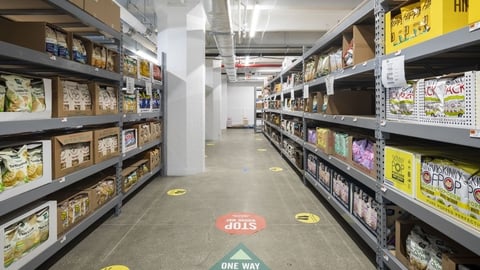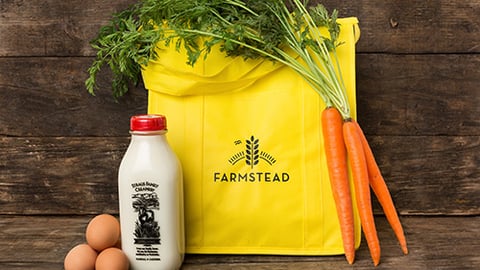Farmstead Offers In-House Software to Other Retailers
Following the debut of Whole Foods Market’s delivery-only store in Brooklyn, e-grocer Farmstead has revealed that as well as expanding its own brand nationally, it’s making its in-house grocery delivery software, Grocery OS, available to other national and regional grocers, to help those businesses compete more effectively with online behemoth Amazon, parent company of Whole Foods Market.
According to Farmstead, Grocery OS instantly increases the delivery capacity and profitability of any grocer-controlled pickup/delivery fulfillment operation, whether from an existing public store, new dark store or delivery-only warehouse. It also allows grocers to control their own marketing, order picking, packing and delivery operations.
The company noted that a “Top 3 US grocer” has already deployed the solution, “which helped them rapidly and inexpensively expand delivery capacity in multiple regional markets on the East Coast.”
“As COVID-19 drives skyrocketing online grocery adoption, many grocers are realizing that a new way forward is required immediately,” said Pradeep Elankumaran, co-founder and CEO of Burlingame, California-based Farmstead. “Existing third-party delivery options increase customers’ costs to levels approximately 20% higher than what the typical U.S. household can support each week, and increase grocers’ fulfillment costs to unsustainable levels. New robotics options increase grocers’ expenses dramatically without actually driving the additional growth required to get to profitability.”
In response, the grocery industry has started hiring its own pick and delivery workforces, while resorting to delivery-only dark-store options in a bid to boost delivery capacity while refining costs, with Amazon leading the charge.
“Unfortunately, controlling costs in dark grocery environments require substantial technology improvements and orchestration that to date have been inaccessible to national grocers,” added Elankumaran.
Easily integrating into existing operations and workforces, Farmstead’s Grocery OS provides grocers access to cutting-edge demand generation, predictive analytics, and labor and driver orchestration tools to help attract and retain in-store customers using the latest online business models and tactics.
The solution, which Farmstead said reduces transaction costs to grocers by 10-15 times relative to existing options, includes:
- Local market digital demand generation that connects to grocer’s existing apps, helping them find, attract and retain in-store customers on the online platforms they spend the most time in, with customer acquisition costs in the low double digits.
- Inventory control, competitive pricing intelligence, and assortment curation to slash food waste from more than 35% to under 5% and high customer baskets.
- Custom-built technology for pick/pack of online orders inside dark stores, supermarket locations and warehouses that cuts costs by half; orders are picked by the grocer’s own associates using Farmstead’s software with pick rates in the hundreds of items per hour.
- Last-mile one-hour (5-mile radius) and batched same-day delivery (50-mile radius) for low or no delivery fees to customers by the grocer’s own drivers, and no additional per-order fees to customers, with delivery cost to the grocer typically less than $10 per order.
- Customer pickup features and orchestration, with cutoffs as low as 20 minutes before the customer arrives.
- Analytics to drive increased customer baskets and CPG marketing.
- Strategic expansion support from Farmstead’s business and operations teams for grocers without their own pick/pack or last-mile delivery workforces.
According to the online grocer, on day one of using the software, each existing supermarket location can unlock an additional 100-150 orders per day in capacity while offering the same selection and prices as in stores, with free delivery to customers; further, dark stores can boost capacity to 1,000-plus orders a day, and with custom warehouses, the solution can support as many as 10,000 orders per day tied to space and SKU selection.






